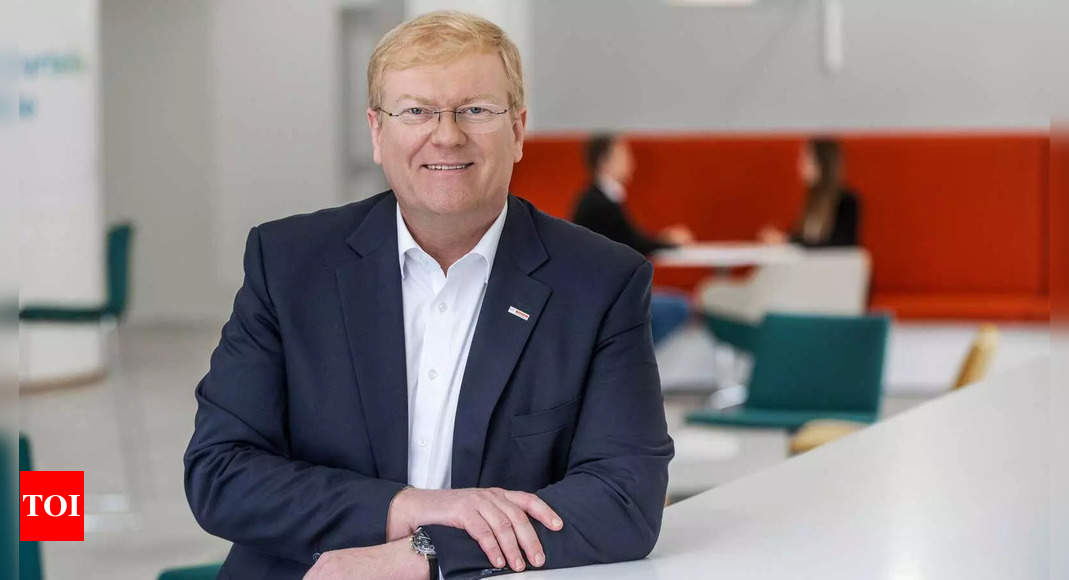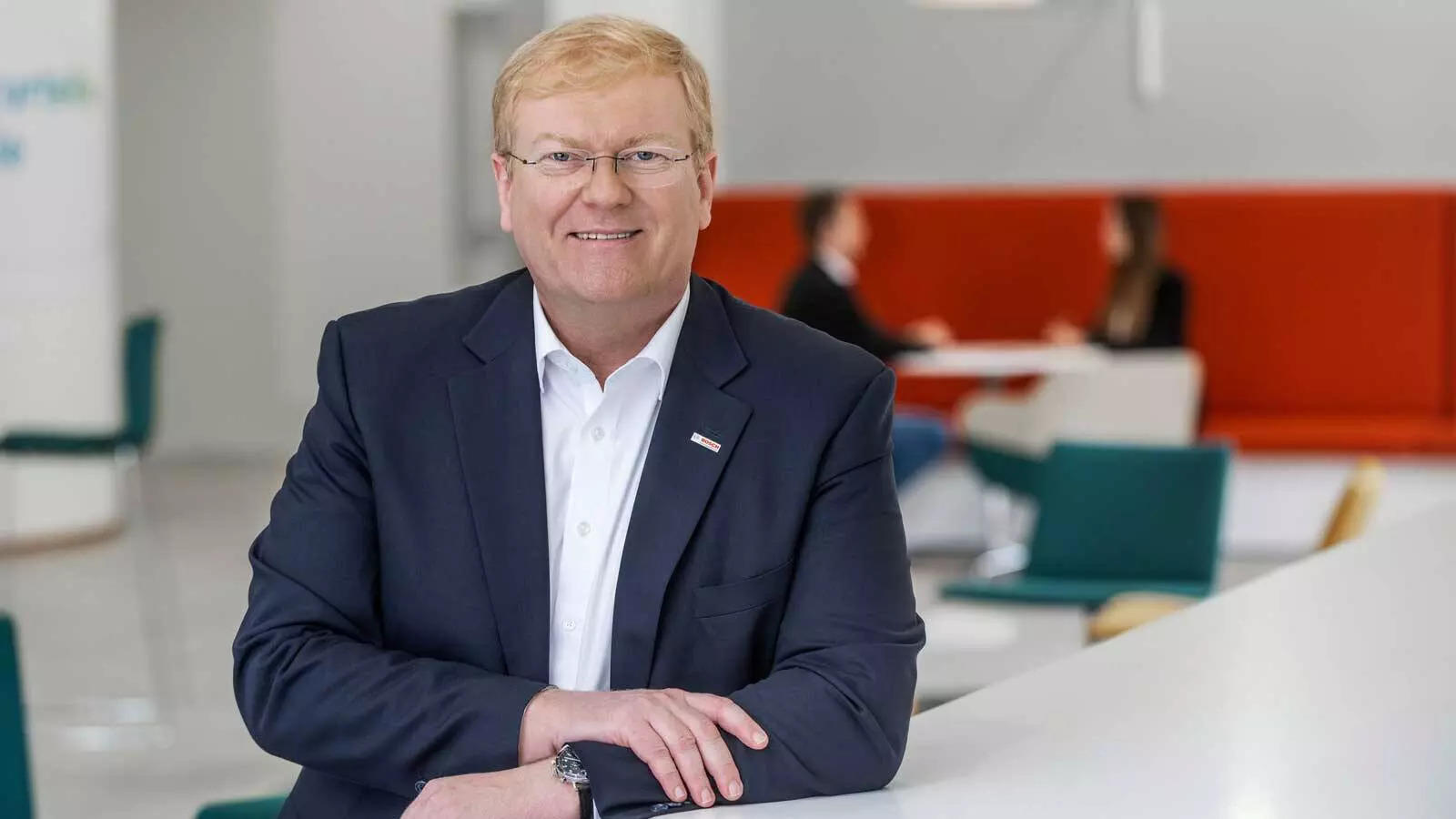[ad_1]
When we met Stefan Hartung, chairman of the nearly $100-billion auto components and engineering giant Robert Bosch, it was soon after he announced the volume production of its hydrogen-based fuel-cell power module last week. It marked the German company’s entry into what it calls the “hydrogen age of mobility”. Bosch plans to be present across the hydrogen chain – from electrolysis (splitting water into hydrogen and oxygen) to the hydrogen engine. The first hydrogen fuel-cell electric truck is scheduled to enter the North American market in the third quarter of 2023, and a Bosch hydrogen engine is expected to be launched starting in 2024.
Hydrogen, Hartung tells us, is a long-term bet. Right now the bigger bet is on electric, but he says electric does not meet all requirements, the vehicles tend to be expensive given the cost of some of the materials the battery needs, and the ability to bring down those costs appears limited for now. So, hydrogen can fill gaps, especially in heavy duty vehicles where battery electric may not make sense.
But Hartung does not dwell much on hydrogen with us. He’s more excited about India. India, he says, will be the only region which for Bosch will have substantial growth in the next two years – as a market and as an engineering force. “This year, there will be a strong last quarter, and next year will be even stronger. In China, there is fear it could be weaker next year than this year, and Europe, we are still unsure,” he says. China and Europe are the company’s biggest markets. He notes the Indian government’s efforts to create “One India”, through measures like GST and Aadhaar. “A lot of things have got unlocked due to this (unified market). There is movement from agriculture to industry,” he says.
That, in turn, he says is inspiring his customers in India to create products that are more affordable. “Everyone is looking at how to make affordable electric cars, how to make products that work where infrastructure is not as developed. So, for us too, as technology providers, the focus is on making things accessible,” he says.
Bosch’s biggest presence in India is in automotive, where it supplies components to almost every automobile maker. The company, which completed 100 years in India last year, today has its biggest software hub in India. The unit called Bosch Global Software Technologies (BGSW) started in India, where it currently has some 30,000 employees.
BGSW, Hartung says, is no longer just into software, but also into hardware design, functional design, and hard-core engineering services. It runsBosch’s IT systems and services. About 200 BGSW engineers in India work on hydrogen technology, out of the 3,000 that work on this technology globally.
“India has a huge involvement in all of our engineering. We have a super-cool group of high talent. We involve all our people intensely in joint projects globally. Some of the project leads are in India. In Stuttgart (Bosch’s headquarters in Germany), we have talent around the IC (internal combustion) engine. India has more software talent,” he says. As software becomes integral to automotive, India’s role is becoming more important.
BGSW for long was a Bengaluru organisation. But Hartung says everyone doesn’t want to come to Bengaluru, so his plan is to spread BGSW across India, to many towns where talent exists. A beginning has been made with Hyderabad, Pune and Coimbatore. “My focus is on accessing talent quickly and supporting the talent, because that is in the end the decisive difference,” he says.
For India, this talent is today trying to make Bosch products more affordable. They are making electrical components cheaper in order to reduce use of products that emit carbondioxide. Hartung says automotive safety is another huge agenda in India, given its high rates of road fatalities. “We are trying to lower the accessibility points for products like ABS (anti-lock braking system) for two-wheelers, ESP (electronic stability programme) for cars,” he says.
(The writer was in Stuttgart at the invitation of Robert Bosch)
Hydrogen, Hartung tells us, is a long-term bet. Right now the bigger bet is on electric, but he says electric does not meet all requirements, the vehicles tend to be expensive given the cost of some of the materials the battery needs, and the ability to bring down those costs appears limited for now. So, hydrogen can fill gaps, especially in heavy duty vehicles where battery electric may not make sense.
But Hartung does not dwell much on hydrogen with us. He’s more excited about India. India, he says, will be the only region which for Bosch will have substantial growth in the next two years – as a market and as an engineering force. “This year, there will be a strong last quarter, and next year will be even stronger. In China, there is fear it could be weaker next year than this year, and Europe, we are still unsure,” he says. China and Europe are the company’s biggest markets. He notes the Indian government’s efforts to create “One India”, through measures like GST and Aadhaar. “A lot of things have got unlocked due to this (unified market). There is movement from agriculture to industry,” he says.
That, in turn, he says is inspiring his customers in India to create products that are more affordable. “Everyone is looking at how to make affordable electric cars, how to make products that work where infrastructure is not as developed. So, for us too, as technology providers, the focus is on making things accessible,” he says.
Bosch’s biggest presence in India is in automotive, where it supplies components to almost every automobile maker. The company, which completed 100 years in India last year, today has its biggest software hub in India. The unit called Bosch Global Software Technologies (BGSW) started in India, where it currently has some 30,000 employees.
BGSW, Hartung says, is no longer just into software, but also into hardware design, functional design, and hard-core engineering services. It runsBosch’s IT systems and services. About 200 BGSW engineers in India work on hydrogen technology, out of the 3,000 that work on this technology globally.
“India has a huge involvement in all of our engineering. We have a super-cool group of high talent. We involve all our people intensely in joint projects globally. Some of the project leads are in India. In Stuttgart (Bosch’s headquarters in Germany), we have talent around the IC (internal combustion) engine. India has more software talent,” he says. As software becomes integral to automotive, India’s role is becoming more important.
BGSW for long was a Bengaluru organisation. But Hartung says everyone doesn’t want to come to Bengaluru, so his plan is to spread BGSW across India, to many towns where talent exists. A beginning has been made with Hyderabad, Pune and Coimbatore. “My focus is on accessing talent quickly and supporting the talent, because that is in the end the decisive difference,” he says.
For India, this talent is today trying to make Bosch products more affordable. They are making electrical components cheaper in order to reduce use of products that emit carbondioxide. Hartung says automotive safety is another huge agenda in India, given its high rates of road fatalities. “We are trying to lower the accessibility points for products like ABS (anti-lock braking system) for two-wheelers, ESP (electronic stability programme) for cars,” he says.
(The writer was in Stuttgart at the invitation of Robert Bosch)
[ad_2]
Source link











More Stories
India’S Growth Forecast: S&P ups India’s FY’24 growth forecast to 6.4% on robust domestic momentum
India to remain fastest-growing major economy, but demand uneven: Poll
Jack Ma: Jack Ma gets back into business with ‘Ma’s Kitchen Food’